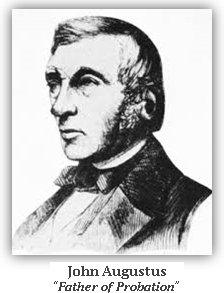
John Augustus, the "Father of Probation," is recognized as the first true probation officer. Augustus was born in Woburn, Massachusetts in 1785. By 1829, he was a permanent resident of Boston and the owner of a successful boot-making business. It was undoubtedly his membership in the Washington Total Abstinence Society that led him to the Boston courts. Washingtonians abstained from alcohol themselves and were convinced that abusers of alcohol could be rehabilitated through understanding, kindness, and sustained moral suasion, rather than through conviction and jail sentences.
In 1841, John Augustus attended police court to bail out a "common drunkard," the first probationer. The offender was ordered to appear in court three weeks later for sentencing. He returned to court a sober man, accompanied by Augustus. To the astonishment of all in attendance, his appearance and demeanor had dramatically changed.
Augustus thus began an 18-year career as a volunteer probation officer. Not all of the offenders helped by Augustus were alcohol abusers, nor were all prospective probationers taken under his wing. Close attention was paid to evaluating whether or not a candidate would likely prove to be a successful subject for probation. The offender's character, age, and the people, places, and things apt to influence him or her were all considered.
Augustus was subsequently credited with founding the investigations process, one of three main concepts of modern probation, the other two being intake and supervision. Augustus, who kept detailed notes on his activities, was also the first to apply the term "probation" to his method of treating offenders.
By 1858, John Augustus had provided bail for 1,946 men and women. Reportedly, only 10 of this number forfeited their bond, a remarkable accomplishment when measured against any standard. His reformer's zeal and dogged persistence won him the opposition of certain segments of Boston society as well as the devotion and aid of many Boston philanthropists and organizations. The first probation statute, enacted in Massachusetts shortly after this death in 1859, was widely attributed to his efforts.
Following the passage of that first statute, probation spread gradually throughout the United States. The juvenile court movement contributed greatly to the development of probation as a legally-recognized method of dealing with offenders. The first juvenile court was established in Chicago in 1899. Formalization of the intake process is credited to the founders of the Illinois juvenile court. Soon after, 30 states introduced probation as a part of the juvenile court procedure. Today, all states offer both juvenile and adult probation.
Matthew Davenport Hill, a lawyer from England is also noted to have contributed to the development of modern probation. Hill had witnessed the sentencing of youthful offenders to one-day terms on the condition that they be returned to a parent or guardian who would closely supervise them. When he eventually became the Recorder of Birmingham, a judicial post, he used a similar practice for individuals who did not seem hopelessly corrupt. If offenders demonstrated a promise for rehabilitation, they were placed in the hands of generous guardians who willingly took charge of them. Hill had police officers pay periodic visits to these guardians in an effort to track the offender's progress and keep a running account.